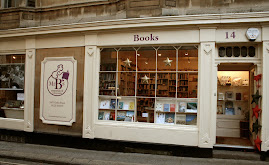This year all of the Mr B’s Team have taken on different reading challenges, so here’s my plan. For every four books that I read I will make sure that one is a non-fiction book, in a bid to address my deep-seated fear of factual reading.
So without any hesitation here are my first three reads of the year…

1. The Concert Ticket by Olga Grushin (Penguin, 2010)
If you missed Mr B’s gorgeous 2010 Christmas Catalogue then you may not have spotted Olga Grushin’s fabulous novel about a never-ending queue, which quickly forms at a mysterious booth in chilly Russia.
When the queue begins, its members have no idea what they are queuing for, but nevertheless Anna, a schoolteacher, takes a place and waits… At last it is announced that tickets for a one-off concert by a famous exiled composer will be sold and each of Anna’s small family takes their turn in line minding the family’s place. But the wait is far from over and as time goes on the queue operates later and later into the night and each of the family begin to develop their own obsessions and plans for the lone ticket.
I loved the way that Grushin gradually wound the stories of each member of the family closer and closer together creating a really claustrophobic and cleverly interlaced plot. An absolutely fantastic start to my reading year.
2. Catching Fire: How Cooking Made Us Human by Richard Wrangham (Profile Books, 2010)

My first non-fiction read of the year. I’ve had my eye on this for some time but I’ve been distracted by so many great novels I’ve only just got round to it. Wrangham puts forward a really fascinating and well-argued theory that suggests consuming cooked food has played a vital role in our evolution.
He looks at the evidence from raw-foodists who live predominantly on a diet of raw or slightly heated meals and notes how this kind of extreme eating pattern affects our bodies. Time and time aga
in research finds that the amount of energy that our bodies can take from raw food is significantly lower than that acquired from cooked foods. Wrangham then considers the cook’s body and analyses how some of the key changes that evolution has brought about (smaller blunter teeth, a smaller gut, a larger brain) can be explained by the introduction of cooked food into the diet. He also finds evidence from changes in our social behaviour that supports his theory.
But perhaps the most interesting aspect of Wrangham’s theory is his chapters on the way that cooked food has shaped our social behaviour and defined the roles of the sexes in such an enduring manner that these gender-specific behaviours are still evident in most homes today.
This book made my new journey into the world of non-fiction seem easy, it really was incredibly interesting and the arguments were so logically described that I found it an easy and rewarding theory to follow.
3. Caroline: A Mystery by Cornelius Medvei (Harvill Secker, 2011)

It may sound bonkers but here it is… a middle aged man finds a donkey, is taken in by her doe-eyes and calm demeanour, walks her the many miles back to his inner city home, installs her in his garden, takes her to work and teaches her to play chess!
This crazy little novel really made me laugh, the description of Mr Shaw’s relationship with Caroline (the donkey) is so cleverly presented, and Caroline is brilliantly portrayed as a graceful, intelligent and hugely enigmatic character. The story is studded throughout with photographs, character reports and articles from Mr Shaw’s collection, which chart his research and growing obsession with donkeys, lending further authority to this surreal and yet entirely conceivable story.
A genuinely hilarious and wonderfully told story.

























